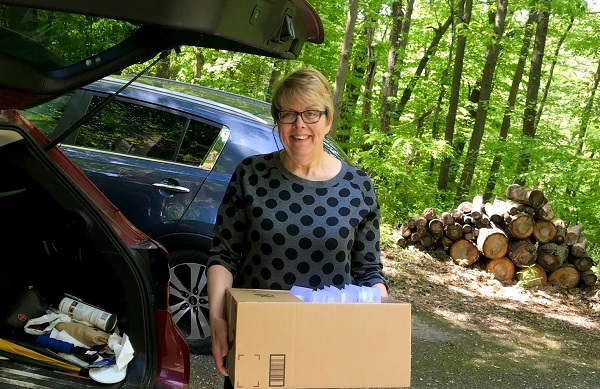Photo: Michele Knoll, founder of Progress Through Pages
“There is no such thing as a child who hates to read; there are only children who have not found the right book.”
— Frank Serafini
Helping Pittsburgh kids find their “right book” is the passion of longtime educator Michele Knoll of Ohio Township.
Earlier this year, she organized a nonprofit, Progress Through Pages, to encourage like-minded literacy crusaders to provide books that kids can own, not just borrow.
“Most of us take owning a book for granted,” Michele says, “but for many children in our area, owning their own book isn’t possible. Yet, it’s a critical step in shaping their future academic success.”

According to the “Handbook of Early Literacy Research,” a typical middle-class home has an average of 13 books per child. For families living in an economically disadvantaged neighborhood, the average is one book per 300 kids.
“You might think that’s an exaggeration, but I visit homes all the time where there are no books,” Michele says. “None.”
With degrees in Elementary Education and Early Intervention from the University of Pittsburgh, Michele’s career includes teaching at elementary schools, directing a preschool, working at Head Start, serving as a staff educator at Carnegie Science Center and a school board director at Avonworth School District.
Currently a developmental specialist for kids from birth-to-age-3, Michele sees first-hand how barriers to book ownership impact her little clients.
“Some families have no access to a bookstore, or the parent may have a disability that prevents them from getting to a library,” she explains. “Or they may be reluctant to go back to a library if they have a fine.”
Even a lot of childcare centers don’t own many books, she says.
“These children are shut out of reading during the most important period in their intellectual development.”

But books can change lives. A study published early this year in Social Science Researchaffirms the vital role books play in helping kids develop skills in multiple subjects, including digital technology. Data drawn from families in 31 societies around the world concluded that after kids read about 80 books, their learning capacity “surges.” The study notes that benefits are strongest for kids from the most disadvantaged homes.
Progress Through Pages is working on getting books to those kids.
The organization received a shipment of books from United Way last spring and made its first donation to Sto-Rox School District. Since then, Progress Through Pages collected over 3,000 books and distributed nearly 2,300 to schools in Duquesne, Penn Hills, Bellevue, Avalon and Avonworth.

Whenever possible, the organization sends volunteers to schools to read to students.
“The presence of someone reading to a child is invaluable,” Michele says. “A live reader models the actions that accompany reading — pointing to pictures, turning pages, righting a book and so on. Children have to master these developmental milestones, and hearing someone read out loud helps a child discern cadence and subtleties of language.”
Now that the word is getting out, Michele finds it easier to recruit volunteers and acquire book donations.
“It’s taken on a life of its own,” Michele says. “Every time I go to a public event, someone asks if we need books or can they get books from us.”
The effort is worth the outcome, she says.
“In the perfect world we all envision, every child would grow up to lead a happy and productive life,” Michele says. “If Progress Though Pages can use the power of reading to get that journey started, then we’ve truly made a difference — one book at a time.”







